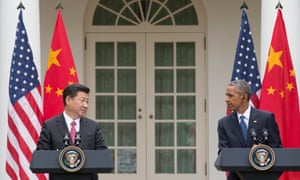US and China back off internet arms race but Obama leaves sanctions on the table
China and the US sought to paper over their differences on cybersecurity on Friday after an inconclusive summit aimed at defusing a growing internet arms race between the world’s two largest economies.
Though welcoming a pledge by the Chinese president, Xi Jinping, to avoid “knowingly” spying on US companies, Barack Obama revealed he had threatened to pursue sanctions against Chinese entities the US suspects of carrying out a series of attacks that have enraged American politicians and businesses.
“What I’ve said to President Xi, and what I say to the American people, [is] the question now is: ‘Are words followed by actions?’,” said the US president.
“We did not, at our level, have specific discussion of individual cases but I did indicate to President Xi that we will apply [sanctions] and whatever other tools we have in our toolkit to go after cybercriminals either retrospectively or prospectively.”
Xi responded by warning against “politicising” the threat from computer hacking and argued that, with the world’s largest number of internet users and less developed offensive capabilities, China had more to lose from cybercrime.
“Overall, the United States is the strongest country in terms of cyber-strength,” said Xi. “China is the world’s biggest country in terms of the number of web users.”
He added: “We have broad common interests but we need to strengthen cooperation and avoid confrontation, and nor should we politicise this issue.”
Tensions have flared between the two countries and become a major theme of the US presidential election campaign after a spate of recent attacks, primarily against US government computers.
However, evidence of extensive US cyber-espionage against China – revealed by the National Security Agency whistleblower Edward Snowden – overshadowed the last big attempt to tackle the issue during a previous meeting between the two leaders in Sunnylands, California.
This time diplomats were anxious to stress progress on a number of other fronts, most noticeably the environment, where China has agreed to launch a national cap-and-trade scheme in 2017 to try to limit its carbon pollution.
News of this deal, first revealed on Thursday, was followed up before their press conference in the White House rose garden on Friday with further details of China’s willingness to help other countries deal with the impact of climate change.
A fact sheet released by the White House said China’s new climate finance commitment “included CNY 20 billion ($3.1bn) to help developing countries combat climate change and new steps to control public support for high carbon activities”. This figure is more than the US has committed, and could prompt other countries to increase their contributions at the forthcoming Paris climate summit.
The two leaders also reached an understanding on an accounting method to keep track of emissions reductions – a persistent obstacle to a deal at Paris – and ensure further, deeper reductions in the future.
It was the issue of hacking, however, that dominated the two-day meeting in Washington, particularly after US officials began the summit by claiming that a recent hack of government personnel records that it blames on China involved the theft of 5.6m fingerprints taken from government employees.
Though focusing on the threat to corporate interests, Obama made clear he had little truck with Chinese arguments that hacking attacks were carried out by non-state actors with no connection to the government.
“President Xi indicated to me that with 1.3 billion people he can’t guarantee the behaviour of every single person on Chinese soil. I understand that,” he said. “What I can guarantee, though, and what I am hoping that President Xi will show me is that we are not sponsoring these activities and that … we take it seriously and will cooperate to enforce the law.”
Xi said the two presidents had “a long history” of discussing the issue and promised further talks.
“We have reached a lot of consensus on cybersecurity, including some new consensus,” he concluded.
On Saturday Xi heads to New York and he will give his first speech to the UN general assembly on Monday.

No comments:
Post a Comment
Comments always welcome!